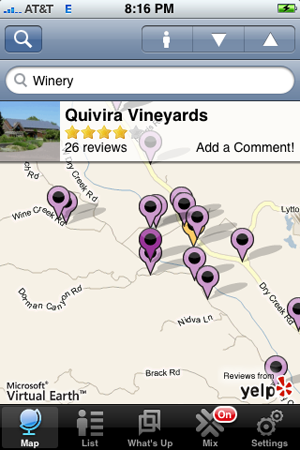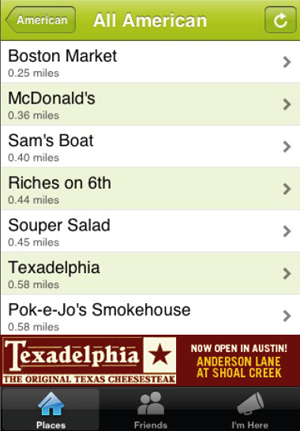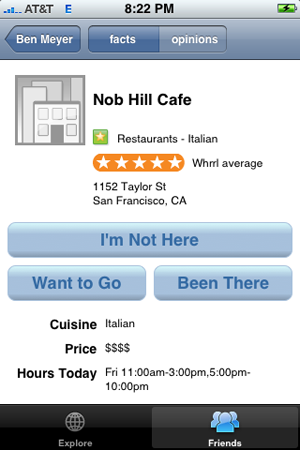Desperate times call for desperate measures, and that's where the newspaper business is right now. With profits slashed, unending layoffs, and online ad growth slowing, newspapers have to be open to new ideas that will help them deal with a media shift like no other. Last week I looked at the concept of crowdfunding, with people paying journalists directly for stories. This week, I heard another out-of-the-box idea: having newspapers help local businesses buy key words for Google AdWords or place Facebook ads -- acting as a local ad agency.
That idea came from Stephen Gray, the managing director of Newspaper Next, a project of the American Press Institute with one goal: to help newspapers come up with a profitable business model. Gray is a former managing publisher of the Christian Science Monitor, and was president of Monroe Publishing Co., which ran his family's newspaper in Monroe, Mich. Since 2005, he has been tasked with helping American newspapers save themselves -- a tall task, to say the least.
After a year of study in 2006, Newspaper Next released its first report, Blueprint for Transformation (a 98-page PDF file), and in early 2008 followed up with Making the Leap Beyond Newspaper Companies (a 110-page PDF with case studies). Gray has helped run more than 40 public training sessions and 30 private talks with newspapers based on his findings. While he is encouraged that newspapers are finally breaking out of their fixation on mass audiences and launching niche websites (such as mom sites and young adults sites), he feels they still don't understand how to serve local businesses.

Stephen Gray
"The difficult part is helping newspapers understand that if they want new business they need to get a new job done for businesses that they're not serving," Gray told me. "You can't just sell them the newspaper because you haven't been able to do that for 50 years. You need to have an offering to get that done."
So what kind of offering should newspapers have? Gray says they need to help local businesses connect to customers right at the point of interest in a product or service. The problem is that most newspapers are not focused on any kind of local search offering, and cede that ground to search engines such as Google or Yahoo. But Gray thinks the search engine offerings for local businesses aren't very good, and that presents an opening for newspapers.
"[Newspapers] should become the leading local Internet ad agency, which goes against ancient newspaper instinct of not ever helping anyone who is your competitor," he said. "But the fact is that audiences have split in a million directions, so here we are in a local market and our job is to help businesses in our local market succeed. If that means we are placing ads on Google and Facebook for local businesses, so what? That's what it takes to succeed and ad agencies have been making a living off doing that for some time."
I talked in-depth to Gray about what Newspaper Next has tried to accomplish, and he talked about the group's findings and its struggles in getting newspapers to change quickly enough. The following is an edited transcript of our phone conversation.
What was the mission of Newspaper Next?
Stephen Gray: It was to provide newspaper companies with a pragmatic set of tools, concepts and processes to expand and diversify their declining business model. The business model was declining three years ago when we were starting out and it's only accelerated since then. So we wanted to give them an understanding of what was happening from a very different perspective and a set of practical processes they could adopt and use at newspapers big and small to create new solutions, new revenues for new audiences.
So there was a research element of your work first and then you did training and action items?
Gray: The research element was the first year. We started in the fall of 2005 and engaged Harvard Business School professor Clayton Christensen and his consulting firm Innosite for a year. We looked at the industry, looked at what was happening, looked at initiatives people were undertaking. A fundamental part of it was the Christensen approach, he studied more than 60 disrupted industries to see what the patterns were. We took his work and adapted it to the newspaper industry and saw how they were living out the usual scenario when an established industry gets disrupted.
In the first year we were like a think tank, and recruited seven newspaper sites to become demonstration sites and worked with each of them, teaching them the materials we were developing so they could develop new products for niche audiences. That was in year one, and in September '06, I took that on the road. For the newer 2.0 report, I went back to a number of companies that had the training early and asked what they had been doing. Their projects became the case-book section of the new report, with 24 new products -- print products, websites, combination products, even a consignment store. A variety of things that were generated using the Newspaper Next approach were used as examples in the 2.0 report.
What has worked with your approach?
Gray: What has really taken hold is the concept that while newspapers are mass-market products, and many of them think in that vein about large audiences, the most dramatic success is in getting hundreds of newspapers to develop products aimed at niches. They are generating new revenue streams and have added to the mass audience they have with news. And they can sell advertising to businesses that want to reach those niches.
Recently, I've been calling publishers at newspapers of various sizes and I'm finding that to be a pattern everywhere I call. They can list three to five new products that they've created in the last year that target audiences that they weren't reaching effectively before. [These include] a publication for farmers in the agricultural community for a newspaper that is a general interest publication; websites for moms, who are usually too busy to read newspapers; sites for young adults; Spanish-language sites.
And where have you struggled?
Gray: The hardest thing is on the other side of the business. It's a business that has two customer groups: there's the consumer side and the business customer. For a business, the newspaper allows them to communicate with a customer or potential customer. In that area, it's the hardest going. People in newsrooms, reporters, editors, are quite good at visualizing a consumer's life and creating a package of content that gets at what those people need. That's being done well in a lot of places in the industry.
What's not being done is realizing that in your community -- say, a 50,000 person community, you have 1,500 or 2,000 active advertisers but there are 8,000 businesses that serve consumers in your market. So three-quarters of them are not your customer. The difficult part is helping newspapers understand that if they want new business they need to get a new job done for businesses that they're not serving.

Yellow Pages have hit hard times
It's not that we don't know what that is. Some of what they want is: a one-to-one relationship with customers; a way to respond to what's going on in customers' lives; make sure they hear about me when they make a choice. The traditional product built on that job is the Yellow Pages, but I just read an article saying the Yellow Pages are expected to lose 39% of revenues in the next four years. Increasingly if we want to find something, we don't go to the Yellow Pages, we go online, and Google doesn't always work well.
Google isn't doing it all that well yet, and the Yellow Pages aren't doing it that well, so we're saying, 'Look this is where you [newspapers] should be.' It's very hard for ad staffs and management at newspapers to get their minds around the fact that not everyone wants mass reach, and once you understand the needs, you take the technology available today and use them to get the job done.
You talked about a change of mindset for reporters and editors to do editorial for niche audiences. Is it the same problem for ad sales and business staff who have to rethink making big sales for print ads vs. doing things on a smaller scale?
Gray: It's not necessarily smaller. The Newspaper Association of America lately has been preaching that we have to stop selling products and start selling audiences. I think that's about one-third of the steps we need to be making. We have been selling products -- selling the newspaper or a three-column print ad. But a local business isn't looking to buy an ad; they are looking to attract a certain kind of customer. NAA started preaching that you should sell audiences, meaning you have the newspaper, the mom site, the young adult site, etc. So you go to an advertiser and say 'here are all the audiences I can reach for you.'
That's an improvement, but the business doesn't want to buy an audience, they want to get their potential customers to know that they exist. Newspapers need to find out what businesses want to do, and then pull out of our bag of tricks (which so far doesn't have much in it), ideally you'd have 10 different things you could offer, whether it's a niche website to a text message and on and on. You find out what the business is trying to do, and pull something together from your toolkit to help them do it.
When I talk to newspaper publishers and ad directors I get a very clear picture that newspapers have been slow to understand the value of the Internet to local businesses, but local businesses have been even slower to get that. There are a few who get it, and they have a great website, but mostly it's 'we have a website that my nephew did three years ago and it doesn't do much.'
That's another piece we should be offering, it's not just 'buy banner ads on my news website.' It's 'we can make your business effective on the Internet.' And that might include doing your website or buying the keywords you should have on Google AdWords for our market. It might involve the newspaper buying ads on Facebook for a pizza place so that college students in Dayton, Ohio, see your ad. Or help set up a widget so the college kid can order pizza off their desktop.
Have you looked at how editorial should shift their thinking, too?
Gray: We made a conscious decision to leave that to others, as there are enough people working on that already. But the methodology that we teach has been applied in newsrooms with fascinating results. In the 2.0 report, there is a case study about the Pocono (Pa.) Record. In the first step of our process, we tell people to go out and talk to people in their communities who you hope would be your customers.

Pocono Record's coupon section
The Pocono Record sent out 13 people from the newsroom who did 200 interviews with readers of the newspaper. They talked to all these people and came up with a list of eight or nine subject areas that people had difficulty finding in their community. People weren't getting the kind of education information they wanted, they wanted more on infrustructure, golf, traffic, [and more]. So they figured out ways to beef up coverage of these things in the newspaper and changed some sections, which rolled over into the website, where they had more topic areas.
They did this in 2007 and by the end of the year, their print circulation was up, their web traffic was up 50% and their web revenues were up about 50%. What happened was that the website became known in the community as the place you would find out about everything, so they were able to raise their web ad rates. I think that could be repeated at every newspaper in America.
What about web video? I've written about companies helping small businesses do mini-informercials online for their business, and many newspapers also do videos with pre-roll ads. The content of most newspaper videos varies a lot, but what have you found to be best practices for monetizing video?
Gray: For the 2008 report, we partnered with Borrell Associates...and their conclusion was that at most newspapers the photo staff is shooting video and doing news video and posting it on their sites. This is typical of what Christensen found out about how people react in disrupted industries: 'Uh-oh, there's a new technology so we better get ahead on that technology.' But all you're doing with news video is giving your current customers something else to look at. There's not a lot of effective sales that use the true potential of advertising on video.
Where Borrell sees the big growth is with the mini-documentaries, the short video that shows what the business looks like, the people who you should trust at that business. And that video sits there as an ad, and you click it because you are interested in what that business does. It's unlike a pre-roll, it isn't forced on you. Overlays, pre-rolls and other video ads might work nationally, but locally businesses have a story to tell and they'd like to use video and it's an opportunity for newspapers to come in at a lower price point than television.
What do you think about crowdfunding, having people pay directly for stories they want to see, with sites like Spot.us?
Gray: I haven't looked at that as part of this project. My core belief is that it will be really hard to generate sufficient revenue to do any meaningful quantity of journalism on a philanthropic basis. The NY Times had an interesting story about VoiceofSanDiego and other non-profit news sites. VoiceofSanDiego has angel funding and they are soliciting funding from people on their website. I was at the Christian Science Monitor and it could be a poster child for this problem. It was never able to generate enough income to sustain its editorial work, and has always been subsidized by the church.
When I was there, we had a "make a donation" button and put it wherever we could on the site. It turned out a small revenue stream but it was insignificant compared to the cost. The bottom line is: I wish [crowdfunding efforts] the best, and I hope they succeed, but I really doubt there's going to be much robust journalism done on that basis.
A lot of people think there will be some kind of magic answer for a new business model for newspapers online. It seems more likely that there will be a lot of small revenue streams that add up. What do you think?
Gray: We've been saying for three years that there's no silver bullet and I've been looking for three years and there's still no silver bullet. I was at a meeting of newspaper CEOs and publishers last week, and people there were saying 'there's no silver bullet.' Everyone realizes that. They wish there was something, but there's really nothing there.
The massive shift for newspaper companies to make is to stop thinking everything is news. They need to start realizing that in this watershed moment, when people stop getting information from a dropper -- once a day I get a drop from a newspaper -- we now live on the ocean and can dip in at any time and get whatever we want. So we will spend a lot less time with things that are designed for everyone like news and spend a lot more time proportionately finding solutions for me and what will help me in my life today. That is a massive change in local markets happening right now. I am preaching in the field that newspapers need to visualize themselves becoming the local information utlity.
What was the mood like at the meeting of CEOs and publishers? Was it like the economic crisis meeting recently held by President Bush? Was there anybody with positive outlooks?
Gray: I've talked to a variety of newspaper publishers, and what I'm seeing is there's a tremendous amount of focus on what we've always done and how that's shrinking. Managing that shrinkage itself is a huge and difficult proposition in itself. You cannot go from black ink to red ink and keep going. So we are seeing the industry go through this horrible round of cost-cutting and job-cutting which is unavoidable. But at the same time the requirement to create new and different offerings that bring new money in -- when is the hardest time to do that? When you're whacking your existing organization.
So everyone has two very incompatible assignments. One simple piece of advice we're hearing is that if you have to make cuts, make sure you use that cut as a tool to get you where you need to be in the future -- not just as a way to lop off costs you'll never see again. You can't cut your way to profitability.
How do you respond from the criticism of Newspaper Next from Poynter's Rick Edmonds: "I have had a reservation about Newspaper Next from the get-go that continues this round. I am not persuaded that newspaper people can simply be repurposed into 'disruptive' entrepreneurs."
Gray: Nobody said it would be easy. It's definitely true that some people cannot get out of the mindsets of the core business. And it's true that being a disruptive entrepreneur is difficult within an organization that is focused almost exclusively on carrying out its traditional functions with traditional structures, processes and products. But we've got to try! What's the alternative if we don't -- ever-smaller revenues from the existing products, and ever-smaller staffs?
Photo of Yellow Pages by Heather Powazek Champ via Flickr.
UPDATE: Jack Shafer of Slate points out to me that Gray's idea about newspapers acting as local ad agencies is far from new. In fact, entrepreneur Mark Cuban (now under an SECcomplain for insider trading) brought up the same idea two years ago on his blog:
From the outside looking in, I think newspapers and any local media organizations have to make a stand and go where you are strong and that is in face-to-face selling and knowing your market better than anyone. You have a local salesforce, they won't. However, you can create self service publishing and ad buying comparable to theirs that is geared towards your market, and complements your face-to-face selling. You might not be as efficient in monetization as Google, but most of your customers will never know the difference. All they will know is that you have earned their trust as the company that handles all their advertising and website ad publishing needs so that they can focus on selling pizzas, laser surgery and cars. That is huge for any small business.
Just like Google Search created the foundation of traffic that led to their algorithms and AdSense network, your newspaper or TV station can create the foundation that led to the creation of your marketwide salesforce. Why not?
 The long-anticipated release of the
The long-anticipated release of the 



 With the travel industry already feeling the pain of the economic downturn, Google on Wednesday convened more than a hundred travel marketing executives at TravelThink 2008 to offer strategies for boosting business, as well as to get feedback.
With the travel industry already feeling the pain of the economic downturn, Google on Wednesday convened more than a hundred travel marketing executives at TravelThink 2008 to offer strategies for boosting business, as well as to get feedback.





